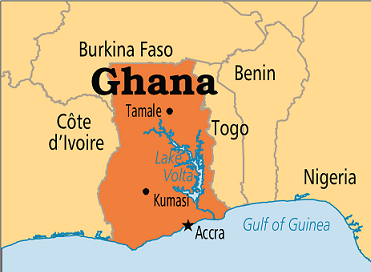
info.afrindex.com
China-Africa Trade Information Service

info.afrindex.com
China-Africa Trade Information Service

Image from Operation World
According to data from the World Bank, Ghana's economic growth rate in 2017 is almost double that of 2016, and its growth strength continues into 2018. The country traditionally relies on primary commodities for income, with gold and cocoa as its main exports. In addition, as a large number of new oil fields are put into operation, oil production is accelerating and Ghana becomes an oil exporter.
With a GDP of GHS256.6bn ($55.4bn) at the end of 2018, Ghana is also a contender to become the year’s fastest-growing economy worldwide. As it tries to move away from traditional resource dependency, the country now faces the challenge of ensuring the widest benefit from that expansion, particularly given its growing and increasingly urbanised population.
The discovery of large offshore oil reserves has had a significant impact on the national balance sheet, with shipments of crude oil representing the second-largest export category in 2017 after gold. Ghana is a relative newcomer to the global hydrocarbons industry, and with proven oil reserves of around 660m barrels and an output of about 126,000 barrels per day, it is a small producer by regional standards, but there is considerable potential for growth. The ongoing expansion of commercial operations into new reserves has led some commentators to identify Ghana as the world’s next oil hotspot, raising hopes that the export of oil and its derivatives can sustain a new era of economic prosperity. Moreover, there are a number of developments to boost the supply of gas feedstock to Ghana’s thermal power stations in the short term, such as the offshore Sankofa field.
Ghana is one of the world's top-10 gold producers and the second largest in Africa. A wave of investments in recent years has boosted production and improved cost efficiency in gold and manganese mining, while the government has acted firmly to improve industry regulation, tackle long-term issues such as illegal activity and environmental damage, and strengthen assaying capacity. Ghana boasts political stability and a strong institutional framework, and these factors are expected to continue to underpin investment in the mining sector in years to come.
Ghana's agricultural output increased in 2017 and 2018, driven in large part by government policy and expenditure. According to the Ghana Statistical Service, agriculture grew 5.5% year-on-year in the third quarter of 2018, outpacing general non-oil GDP growth the same year. Industrialisation and productivity improvement programmes are expected to expand the yields from the agriculture sector, as well as create jobs and encourage greater private sector participation. The country has secured considerable funding from multilateral lending organisations and bilateral national partners to finance its ambitious agricultural agenda over the next few years, ensuring a promising outlook for the sector.